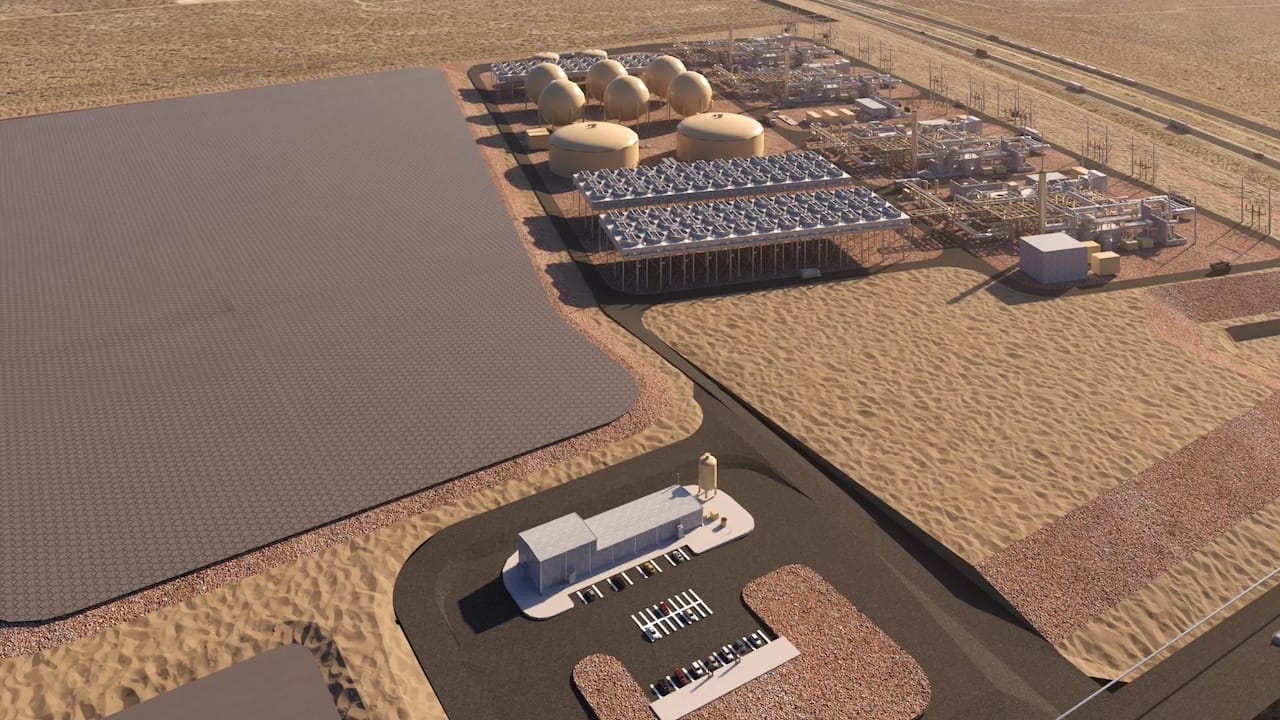Hey there, welcome this week’s issue of Climate Tech Canada. The Earth’s average temperature crossed 1.5 C for the first time in 2024. Headlines are saying we’ve “breached” a limit, but that’s not really how it works.
As IPCC author Joeri Rogelj and climate scientist Katharine Hayhoe point out, 1.5 C is a long-term, political goal to limit warming, not an irreversible tipping point. Hitting 1.5 C in 2024 is still Not Good, but we’re not sunk yet. Every fraction of a degree matters.
We’re kicking off this week’s issue with Hydrostor’s huge US$1.76 billion loan for a 500MW long-duration energy storage project in California. We also take a look at the climate policies left in the lurch by Trudeau’s resignation, a B.C. non-profit building the “Tinder for building materials”, and Aruna Revolution makes a deal for compostable manufacturing on Dragons’ Den.
P.s. Did someone forward you this email? Subscribe below for weekly climate tech news, insights, job openings and more👇️
TECH
Hydrostor lands $1.76B loan for long-duration energy storage

Source: Hydrostor
What happened: Hydrostor secured a US$1.76 billion conditional loan commitment from the U.S. Department of Energy’s Loan Programs Office to build a 500 MW long-duration energy storage project in California.
The tech: Hydrostor’s advanced compressed air energy storage (A-CAES) system works by compressing air and storing it in underground caverns. When power is needed, the pressurized air is reheated and released through turbines, generating electricity.
Hydrostor is able to get better efficiency than traditional methods by capturing heat from the compression step and using it to reheat the air as it goes into the turbines, while water from a reservoir maintains constant pressure for more consistent power output.
Why it matters: Grid-scale energy storage is a critical unlock for power grids that are adopting more renewable energy. When wind and solar generation is low, long-duration energy storage can fill in those gaps.
Lithium-ion batteries typically provide up to 4 hours of storage, while Hydrostor’s solution can store energy for up to 8 hours. Compressed air also has a much longer operating lifespan of about 50 years.
What’s next: Construction is expected to start this year and start operating in 2030. The company already has a 25-year power purchase agreement with Central Coast Community Energy. The DOE funding is a big vote of confidence for Hydrostor and an important milestone for commercialization.
SPONSORED BY THE RUNDOWN AI
Start learning AI in 2025
Everyone talks about AI, but no one has the time to learn it. So, we found the easiest way to learn AI in as little time as possible: The Rundown AI.
It's a free AI newsletter that keeps you up-to-date on the latest AI news, and teaches you how to apply it in just 5 minutes a day.
Plus, complete the quiz after signing up and they’ll recommend the best AI tools, guides, and courses – tailored to your needs.
MILESTONES & PRODUCT
The Building Material Exchange launched to keep waste construction materials in circulation and out of landfills. The B.C.-based non-profit is backed by 150 industry leaders and regional districts.
The federal government announced $11 million for biofuels and low-carbon hydrogen through the Energy Innovation Program and Clean Fuels Fund.
Deep Sky signed a power purchase agreement with energy developer and operator Low Carbon to supply their Alpha project with 100% solar power.
Aruna Revolution appeared on Dragons’ Den, securing a deal for their compostable menstrual pads and manufacturing technology.
Nuclear services company Kinectrics was acquired by BWXT Technologies for $525 million.
Danish food waste startup Too Good To Go is expanding to all Canadian Whole Foods Locations, enabling surplus food to be sold at a discount.
Green materials startup HPQ Silicon will partner with the French Army to develop sustainable, high-capacity batteries.
NEWS
Climate bills collateral

Source: BBC
What happened: Key climate-related bills are dead in the water after Justin Trudeau said he’ll resign as Liberal leader and prorogued parliament.
The background: Prorogation is like hitting a reset button on all legislation, and bills will need to start from scratch when parliament reconvenes. Both the Conservatives and NDP have pledged no-confidence votes when that happens, which will trigger an election.
Why it matters: Several of the Liberals’ climate initiatives are caught up in this legislative reset.
The oil and gas emissions cap, which would have required companies to reduce their pollution by 35% below 2019 levels by 2030. The emission cap was supposed to be implemented later this year.
The Clean Electricity tax credit for provincial and territorial Crown corporations, aimed at supporting investments in low-carbon energy and transmission between provinces. Without it, Crown corps are left responsible for most power generation but without the same financial support as private investments.
Committee hearings on potential misspending at Sustainable Development Technology Canada (SDTC) and the release of related documents will also come to an end.
The bottom line: While the end of these bills is a setback, the upcoming election and how parties integrate climate into their platforms (or not) will have much bigger consequences for Canada’s climate direction.
IN THE NEWS
⚡ Ontario invests in energy efficiency: The province announced $10.9 billion over 12 years for energy efficiency programs, including 30% rebates for home energy efficiency improvements like air sealing, heat pumps and even batteries and solar. The program could reduce peak demand by 3,000 MW (equivalent to ~3 million homes), and deliver $23B in electricity system benefits.
🚌 Lion Electric pitches buses: The electric vehicle maker is pitching the plan to potential buyers as part of a restructuring plan. The company entered creditor protection last month. Lion believes it can be profitable producing 550 buses per year.
🏦 RBC and BMO could leave Net-Zero Banking Alliance: The banks say they’re still committed to climate goals but the Alliance may not be the right vehicle. The comments follow an exodus of major U.S. banks as Republican lawmakers dial-up pressure on climate efforts. Canadian banks are some of the largest fossil fuel lenders.
🛢 Gaps in Alberta oil spill data: Alberta's energy regulator can’t reliably assess the impact of tailing pond spills according to a new study. Public data from 500+ spills suggests the agency is inspecting just over 3% of spills and the volume of spills are likely underreported.
💸 Electric vehicle rebates run out: The federal government abruptly paused its zero-emission vehicle rebate program after funds ran out due to increased demand. The program was scheduled to run until March 2025 and will need additional funding in the next budget to continue. Quebec also paused its EV rebate due last year due to a lack of funding.
Enjoying the newsletter? You probably know someone else who’d enjoy it too.
Share the link below to spread the word (and earn rewards)!
BIG PICTURE
🔥 Palisades fire: Wildfires in L.A. have destroyed thousands of homes and caused more than $20B in damage. The fires have also put climate in the spotlight, from conspiracy theories to the state’s fragile insurance system.
🇨🇳 China’s sweeping new energy law: The regulations set the tone for energy in the country, and prioritize renewables while also promoting the use of oil, gas and coal combined with pollution-limiting tech. Many of the directives affirm existing practices, but there’s a stronger emphasis on energy security.
🛫 Back from the dead: A group of buyers has stepped in to give Lilium, a German electric flying taxi startup, a second chance. The Mobile Uplift Consortium will buy all of the assets needed to restart the business. Could more shuttered climate solutions get a second life?
🚫 Nothing is forever: New York banned the sale of some clothing containing PFAS or “forever chemicals” that are linked to health risks like reproductive issues. Colorado and California have similar bans.
🤝 Pooling emissions: Carmakers in the EU with low EV sales are planning to pool their emissions with industry leaders to avoid hefty fines. Carbon credit sales like this made up almost 3% of Tesla’s $72B revenue last year.
COMMUNITY
🗓 Carbon Removal Day 2025: Hosted by Carbon Removal Canada, this all day event explores current solutions in action, how we can continue to drive innovation, build an inclusive industry, and create the conditions for scaling carbon removal technologies. February 27th, Ottawa.
➡ Discover more climate events.
💻 CERT Systems is hiring a Mechatronics Engineering Lead to lead the development of mechatronic systems producing essential chemicals without fossil fuels.
➡️ Find more open roles.
Share Climate Tech Canada with your network and help us grow! Make {{ rp_num_referrals_until_next_milestone }} referrals to get a {{ rp_next_milestone_name }}. See all rewards here.


